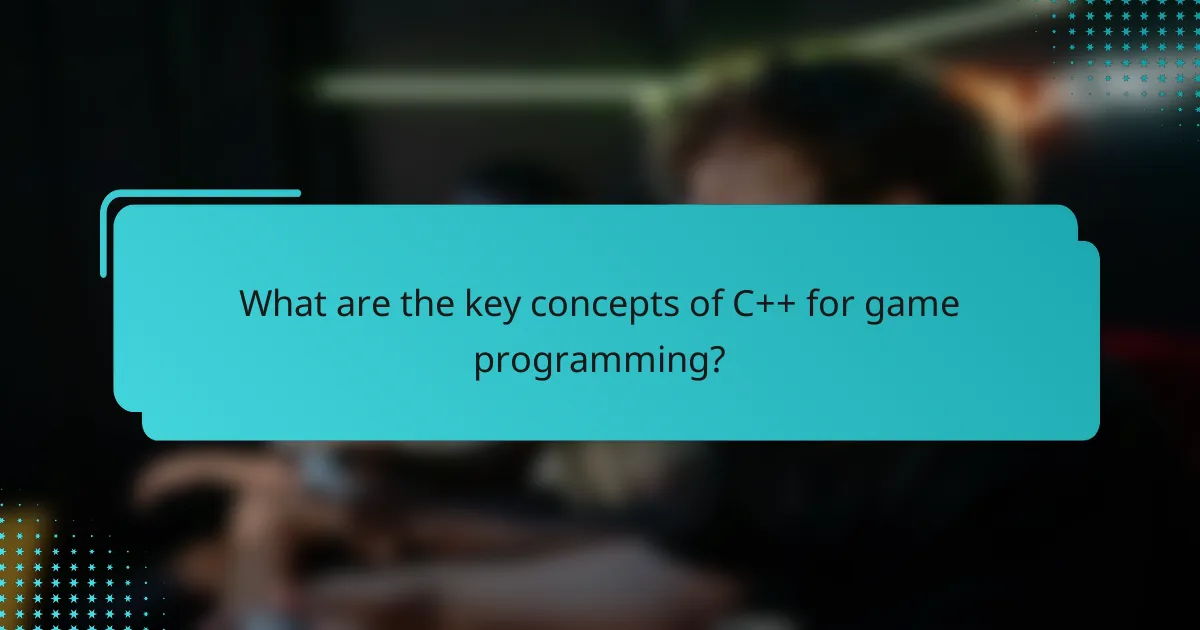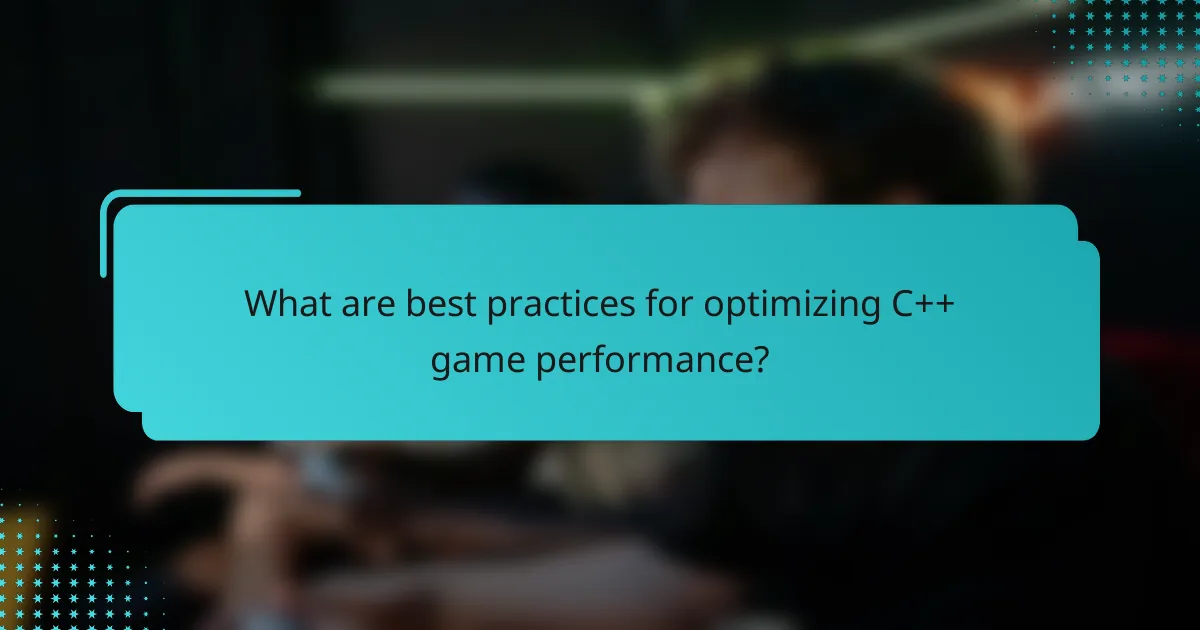
What are the key concepts of C++ for game programming?
Key concepts of C++ for game programming include object-oriented programming, memory management, and performance optimization. Object-oriented programming enables the creation of reusable and modular code through classes and inheritance. Memory management is crucial in games for efficient resource allocation and deallocation, often utilizing pointers and smart pointers. Performance optimization involves techniques like code profiling, minimizing CPU and GPU usage, and optimizing algorithms for speed. Additionally, understanding data structures, concurrency, and templates enhances game performance and scalability. These concepts are foundational for developing complex and efficient game systems.
How does memory management work in C++ for game development?
Memory management in C++ for game development involves manual control over memory allocation and deallocation. Developers use operators like ‘new’ and ‘delete’ for dynamic memory management. This allows for efficient use of resources, crucial in performance-sensitive environments like games.
C++ provides stack and heap memory options. Stack memory is automatically managed, while heap memory requires explicit management by the developer. This flexibility enables optimized performance but increases the risk of memory leaks and fragmentation.
Tools like smart pointers help manage memory automatically, reducing errors. The RAII (Resource Acquisition Is Initialization) principle is often employed to ensure resources are released properly. Profiling tools can track memory usage and identify leaks.
Efficient memory management directly impacts game performance and stability. According to a study by the International Journal of Computer Games Technology, effective memory management can improve frame rates and reduce crashes.
What are the different types of memory allocation in C++?
There are two main types of memory allocation in C++. They are static memory allocation and dynamic memory allocation.
Static memory allocation occurs when memory is allocated at compile time. This type of allocation is fixed and cannot be changed during program execution. Variables defined with static or global storage duration are examples of static memory allocation.
Dynamic memory allocation occurs during runtime. It allows for flexible memory usage as memory can be allocated and deallocated as needed. Functions like `new` and `delete` are used for dynamic memory allocation in C++.
Dynamic memory allocation is useful for managing memory for data structures like linked lists and trees. It allows programs to use memory efficiently based on current needs.
How does dynamic memory allocation affect game performance?
Dynamic memory allocation can significantly impact game performance. It allows for flexible memory usage, adapting to varying resource needs during gameplay. However, frequent allocations and deallocations can lead to fragmentation. This fragmentation may slow down memory access times. A study by Microsoft Research found that excessive dynamic allocation can increase garbage collection times. This results in frame rate drops and stuttering during gameplay. Therefore, careful management of dynamic memory is crucial for maintaining optimal performance in games.
What performance optimization techniques can be applied in C++ games?
Performance optimization techniques in C++ games include memory management, code profiling, and algorithm optimization. Efficient memory management reduces fragmentation and improves access times. Using smart pointers helps manage resource lifetimes effectively. Code profiling identifies bottlenecks and areas needing improvement. Tools like Visual Studio Profiler provide insights into performance metrics. Algorithm optimization involves selecting the most efficient data structures and algorithms. For instance, using hash tables can significantly speed up lookups compared to linear searches. Multithreading can also enhance performance by distributing workloads across multiple CPU cores. These techniques collectively improve the game’s frame rate and responsiveness.
How can code optimization improve game efficiency?
Code optimization can significantly improve game efficiency by reducing resource consumption and enhancing performance. Optimized code executes faster, leading to smoother gameplay. It minimizes memory usage, which is crucial for performance on limited hardware. Efficient algorithms decrease processing time for game logic and graphics rendering. Additionally, optimized code can reduce load times, improving user experience. For instance, using data structures suited for specific tasks can enhance access speed. Profiling tools can identify bottlenecks, guiding developers on where to focus optimization efforts. Overall, code optimization is essential for creating responsive and resource-efficient games.
What role do algorithms play in optimizing game performance?
Algorithms are essential for optimizing game performance. They determine how efficiently a game processes data and executes tasks. For example, pathfinding algorithms like A* help characters navigate environments smoothly. Collision detection algorithms ensure that interactions between game objects are accurately calculated. Additionally, algorithms manage memory allocation and deallocation, which is crucial for maintaining performance in resource-intensive games. According to a study by the International Journal of Computer Games Technology, optimized algorithms can reduce frame rate drops by up to 30%. This demonstrates that well-designed algorithms directly impact gameplay experience and performance stability.
What resources are available for learning C++ in game programming?
Online courses such as Coursera and Udemy offer structured learning paths for C++ in game programming. Books like “Beginning C++ Through Game Programming” provide foundational knowledge. Websites like Codecademy and LearnCpp.com offer interactive tutorials. Forums such as Stack Overflow and GameDev.net facilitate community support and knowledge sharing. YouTube channels dedicated to game development provide video tutorials and practical examples. Game engines like Unreal Engine have extensive documentation and tutorials for C++ programming. Additionally, GitHub repositories often contain open-source projects for hands-on learning.
Which online platforms offer C++ game programming courses?
Udemy, Coursera, and Pluralsight offer C++ game programming courses. Udemy provides a wide range of courses suitable for beginners to advanced learners. Coursera partners with universities to offer structured courses with certificates. Pluralsight focuses on professional development with a subscription model for extensive learning paths. Each platform features user reviews and ratings to validate course quality.
What books are considered essential for mastering C++ in game development?
“Effective C++” by Scott Meyers is essential for mastering C++ in game development. This book covers 55 specific ways to improve your C++ programming skills. It emphasizes best practices that are crucial for game development. “C++ Primer” by Stanley B. Lippman is another key resource. It provides a comprehensive introduction to C++ and its features. “Game Programming Patterns” by Robert Nystrom focuses on design patterns in game development. It offers practical examples and insights tailored for games. “The C++ Programming Language” by Bjarne Stroustrup is also fundamental. It is authored by the creator of C++ and provides in-depth knowledge of the language. These books collectively equip developers with the necessary skills for effective game programming in C++.

How can memory management techniques enhance game performance?
Memory management techniques can significantly enhance game performance by optimizing resource allocation and reducing latency. Efficient memory allocation minimizes the time spent on loading and unloading assets during gameplay. Techniques such as object pooling allow for reusing objects instead of constantly allocating and deallocating memory. This reduces memory fragmentation and improves cache coherence, leading to faster access times. Furthermore, garbage collection strategies can help manage memory leaks, ensuring that resources are available when needed. Profiling tools can identify memory bottlenecks, enabling developers to make informed adjustments. Studies have shown that optimized memory management can lead to a 30% increase in frame rates in resource-intensive games.
Why is memory management crucial for game development?
Memory management is crucial for game development because it directly impacts performance and resource utilization. Efficient memory management ensures that games run smoothly without lag or crashes. Poor memory management can lead to memory leaks, which consume resources unnecessarily. This can degrade gameplay experience and lead to crashes. Games often require real-time processing, making efficient memory allocation essential. Additionally, optimizing memory usage can enhance loading times and overall responsiveness. According to a study by the International Game Developers Association, 70% of developers report memory issues as a significant challenge in game performance. Therefore, effective memory management is vital for creating high-quality games.
What are the consequences of poor memory management in games?
Poor memory management in games leads to performance issues and crashes. Inefficient allocation can cause slow loading times. Excessive memory usage may result in stuttering during gameplay. Memory leaks can accumulate over time, degrading performance. Fragmentation can lead to inefficient memory access patterns. This can increase the likelihood of crashes or freezes. Additionally, it can create a poor user experience. Studies show that memory management directly impacts game stability and performance metrics.
How can developers detect memory leaks in C++?
Developers can detect memory leaks in C++ by using tools like Valgrind and AddressSanitizer. Valgrind is a programming tool that can detect memory management problems. It provides detailed reports on memory usage, including leaks. AddressSanitizer is a fast memory error detector built into compilers like GCC and Clang. It helps identify memory leaks during runtime.
Additionally, developers can implement smart pointers in C++. Smart pointers automatically manage memory, reducing the chance of leaks. Using RAII (Resource Acquisition Is Initialization) is another effective strategy. RAII ensures resources are released when objects go out of scope.
Static code analysis tools can also help find potential leaks. These tools analyze code without executing it, identifying risky memory management practices. Regular code reviews focusing on memory management can further prevent leaks.
These methods are widely accepted in the C++ community for ensuring efficient memory management.
What advanced memory management techniques exist in C++?
Advanced memory management techniques in C++ include smart pointers, memory pools, and custom allocators. Smart pointers, such as std::unique_ptr and std::shared_ptr, manage memory automatically and help prevent memory leaks. Memory pools allocate a large block of memory for multiple objects, reducing fragmentation and improving performance. Custom allocators allow developers to define their own memory allocation strategies tailored to specific needs. These techniques enhance performance and resource management in C++ applications, particularly in game programming where efficiency is critical.
How do smart pointers improve memory management in C++?
Smart pointers improve memory management in C++ by automatically handling resource deallocation. They help prevent memory leaks and dangling pointers. Smart pointers manage the lifetime of dynamically allocated objects. They ensure that memory is released when it is no longer needed. The two main types are unique_ptr and shared_ptr. unique_ptr provides exclusive ownership, while shared_ptr allows shared ownership. This ownership model simplifies memory management in complex applications. According to the C++ Standard Library documentation, smart pointers reduce the risk of errors in manual memory management.
What is the significance of object pooling in game development?
Object pooling is significant in game development because it optimizes memory management and improves performance. It reduces the overhead associated with frequent object creation and destruction. By reusing existing objects, developers can minimize garbage collection and fragmentation. This leads to smoother gameplay and enhanced frame rates. Studies show that object pooling can decrease instantiation time by up to 90%. Additionally, it helps maintain a stable memory footprint during gameplay. This technique is widely adopted in real-time applications where performance is critical. Overall, object pooling is a key strategy for efficient resource management in game development.

What are best practices for optimizing C++ game performance?
To optimize C++ game performance, developers should focus on efficient memory management and code optimization techniques. Using smart pointers helps manage memory automatically, reducing leaks and fragmentation. Profiling tools like Valgrind or Visual Studio Profiler identify performance bottlenecks in the code.
Minimizing the use of dynamic memory allocation during gameplay improves speed. Instead, use object pools for frequently created and destroyed objects. Inline functions can reduce function call overhead, enhancing performance.
Using efficient algorithms and data structures also contributes to better performance. For example, choosing a hash table over a list for lookups can significantly reduce time complexity.
Compiler optimizations, such as enabling optimization flags during the build process, can further enhance performance. Techniques like loop unrolling and function inlining can be automatically applied by the compiler.
Finally, leveraging multithreading can utilize multiple CPU cores, improving game responsiveness and performance. Research shows that well-implemented multithreading can lead to significant performance gains in CPU-bound applications.
How can developers profile their C++ code for performance issues?
Developers can profile their C++ code for performance issues by using profiling tools. These tools analyze code execution and identify bottlenecks. Commonly used profiling tools include gprof, Visual Studio Profiler, and Valgrind. Each tool provides insights into function call frequency and execution time. For instance, gprof generates a call graph that highlights time spent in each function. Visual Studio Profiler offers a user-friendly interface for performance analysis. Valgrind helps detect memory leaks and inefficiencies. Using these tools allows developers to optimize their code effectively. Profiling is essential for improving application performance in C++ game programming.
What tools are available for profiling C++ applications?
Tools available for profiling C++ applications include Valgrind, gprof, and Visual Studio Profiler. Valgrind is an instrumentation framework that provides detailed profiling information, including memory usage and performance metrics. gprof is a GNU profiler that generates call graphs and execution time statistics. Visual Studio Profiler integrates with the Visual Studio IDE, offering performance analysis and memory diagnostics. These tools help developers identify bottlenecks and optimize performance in C++ applications.
How can profiling data inform optimization strategies?
Profiling data informs optimization strategies by providing insights into application performance. It identifies bottlenecks and resource-intensive processes in C++ game programming. Profiling tools, such as Valgrind or gprof, reveal memory usage patterns and CPU cycles consumed by various functions. This data allows developers to focus their optimization efforts on the most impactful areas. For example, if profiling indicates that a specific function consumes 70% of processing time, targeting that function for optimization can yield significant performance gains. Historical data shows that targeted optimizations can improve frame rates by up to 30% in real-time applications. Thus, leveraging profiling data is essential for effective optimization in game development.
What common pitfalls should be avoided in C++ game programming?
Common pitfalls to avoid in C++ game programming include memory leaks. Memory leaks occur when dynamically allocated memory is not properly deallocated. This can lead to increased memory usage and eventual crashes. Another pitfall is using raw pointers instead of smart pointers. Smart pointers manage memory automatically, reducing the risk of leaks and dangling pointers.
Neglecting to optimize performance is also a frequent issue. Failing to profile code can result in inefficient algorithms running in critical game loops. Additionally, not managing resources effectively can lead to excessive loading times and performance issues.
Improper use of multithreading can create race conditions, leading to unpredictable behavior in games. Lastly, ignoring compiler warnings can result in subtle bugs that are difficult to trace. Addressing these pitfalls can significantly improve the quality and performance of C++ game applications.
How can developers ensure efficient resource management in games?
Developers can ensure efficient resource management in games by implementing memory management techniques and optimizing performance. Proper memory allocation and deallocation prevent leaks and fragmentation. Using smart pointers in C++ can automate memory management and reduce errors. Profiling tools help identify performance bottlenecks and optimize resource usage. Asset management systems streamline loading and unloading of game assets. Techniques like object pooling minimize overhead from frequent object creation. Implementing lazy loading ensures resources are only loaded when necessary. These practices collectively enhance game performance and resource efficiency.
What strategies can prevent performance bottlenecks in C++ games?
To prevent performance bottlenecks in C++ games, developers should employ several key strategies. First, optimizing memory management is crucial. Using smart pointers can help manage resource allocation and deallocation effectively. Second, minimizing dynamic memory allocation during gameplay is essential. This can be achieved by using object pools to reuse objects instead of frequently allocating and deallocating memory.
Third, profiling the game to identify bottlenecks is vital. Tools like Visual Studio Profiler and Valgrind can pinpoint performance issues. Fourth, using efficient algorithms and data structures can improve performance. For example, choosing hash tables for quick lookups can reduce time complexity.
Fifth, reducing the frequency of expensive operations is important. This includes limiting the use of physics calculations or rendering calls. Finally, leveraging multithreading can enhance performance by distributing workloads across multiple CPU cores. This approach allows for smoother gameplay and better resource utilization.
What practical tips can enhance C++ game programming skills?
Practice coding regularly to enhance C++ game programming skills. Consistent practice helps solidify concepts and improves problem-solving abilities. Work on small projects to apply learned techniques. This approach allows for experimentation and learning from mistakes. Study existing game code to understand design patterns and best practices. Analyzing real-world examples provides insight into effective coding strategies. Utilize online resources and communities for support and feedback. Engaging with others can lead to new ideas and solutions. Attend workshops or courses focused on C++ game development. Structured learning can accelerate skill acquisition and provide valuable knowledge.
C++ for Game Programming focuses on essential concepts such as memory management techniques, performance optimization, and available learning resources. Key topics include the importance of object-oriented programming, dynamic and static memory allocation, and the impact of memory management on game performance. The article also covers advanced techniques like smart pointers and object pooling, as well as profiling tools to identify performance bottlenecks. Additionally, it provides practical tips for enhancing C++ programming skills and highlights best practices to prevent common pitfalls in game development.